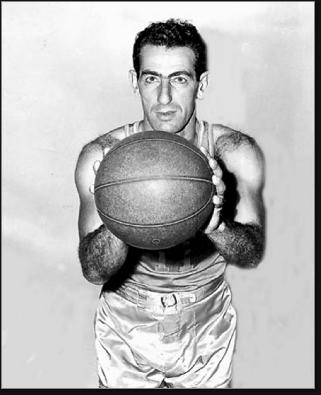
Sport: Basketball
Born: January 14, 1915
Died: June 5, 1993
Town: Trenton, New Jersey
Meyer Bloom was born January 14, 1915 in New York City and grew up in Trenton, NJ. A long, lean and graceful athlete, “Mike” was attracted to basketball at the local YMHA. He was a good ball-handler with a deadly outside set shot. As the soft-spoken, withdrawn teenager grew to his eventual height of 6’6” however, he was slow to develop the physical defensive and rebounding skills of a classic center, preferring to play from the perimeter. That being said, Mike was three times All-State with Trenton Central High School, leading the team to 41 straight victories and state titles in 1932, 1933 and 1934.
Mike played college ball for Temple, and made a huge impact in 1935–36, his first varsity season. He canned a buzzer-beater to defeat Georgetown and led the Owls to a one-point victory over defending national champs NYU. As a senior in 1937–38, Mike earned All-America recognition and teamed with co-captain Don Shields to help the Owls fashion a 23–2 record. That was good enough for a bid to the first-ever National Invitation Tournament. Mike scored 11 in a semifinal blowout over Oklahoma A&M and was the defensive star in the final against Whizzer White and the Colorado Buffaloes. Temple won 60–36 to claim the NIT title and national championship.
After college, Mike was wooed by Phillips Petroleum to join its powerhouse AAU team, the 66ers. Mike turned them down, opting to scratch out a living in the struggling Depression-era pro game.
For much of Mike’s amateur career, his value was enhanced by his skill at winning the center tap. Until 1937, there was a jump ball after every basket. As he entered the pros, his defense and pivot play were his most valuable assets. He began his career with the Philadelphia SPHAs, Washington Brewers and Baltimore Clippers of the American Basketball League, playing one season in each city. In 1941–42, Mike came “home” to the Trenton Tigers.
Mike served in the military during 1942 and 1943, but was able to play for the Tigers and other clubs when time allowed. During the war years, he suited up for the Grumman Hellcats, Newark CO-Twos, Hartford Pros and Brooklyn Jewels.
Meanwhile, Mike ranked among the ABL’s top scorers, leading the league in points in 1943–44 and 1944–45 as a member of the Tigers. He was named ABL MVP both seasons. The following year, he left Trenton for the Baltimore Bullets and led them to the ABL championship over his old team, the SPHAs. The Bullets were a .500 team when he joined them early in the season and finished the year 19–6. The Bullets seemed destined for a second straight ABL title in 1946–47 but opted to skip the league finals to pay in the more lucrative World Basketball Tournament in Chicago.
The Bullets joined the Basketball Association of America in 1947–48. The league played in big cities but lacked big names. Mike’s scoring and shot-blocking made him a crowd favorite, even as his career was winding down at the age of 33. He was traded to the Boston Celtics during the season and then spent 1948–49 with the Minneapolis Lakers and Chicago Stags. He was eight years older than the next-oldest Chicago player that season. Mike played one more year, with the SPHAs, and then called it a career. At the time, he was considered the greatest Jewish “big man” in history.
Mike was married twice—his first wife passed away—and lost a son to a shooting accident and a stepson to a car accident. He had better luck in his business endeavors, inventing a commercial “pipe cleaner” that plumbers now call a “snake.” He also worked in sales for many years.
In 1986, Mike was inducted into the Temple Athletic Hall of Fame. Two years later, at a 50th reunion of the NIT championship team, he was greeted by Temple fans with a long, standing ovation. He passed away in 1993 at the age of 78.